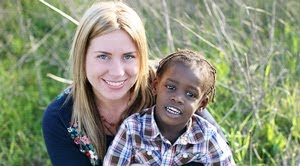I’ve been trying to figure out a way to write about some of the challenges we are dealing with, while at the same time respecting Kembe’s process. It’s difficult to write about adoption issues – adoption (especially of a non-infant) is not for the faint of heart. I want to be honest about our struggles so that we aren’t presenting that false sense of “happily ever after” the minute an adoptive child joins their family. Yet at the same time, it feels a little vulnerable to share some of the realities in a public space, and it’s often easier to just tell stories about paper-cut inducing blocks.
Nevertheless, the reality is that adoption begins with a loss, and Kembe is feeling that loss heavily right now. He is grieving, and trying to figure out his place in our family. Sometimes he does this by trying to act like the parent. Sometimes he does this by acting wounded, defeated, and depressed. Sometimes he rages. Other times, he isolates.
The difficulty is that, try as we might to give him a safe space, he just isn’t at a developmental level to articulate all that he is feeling and experiencing, so it all comes out through his behavior. As a parent, it is both heartbreaking and exhausting to have him struggling so much. I am constantly trying to figure out his cues, to head him off at the pass before a meltdown, and to anticipate his needs and give him a sense of control, while still establishing my role as the parent. By the end of the day, I am a very tired mom. Who am I kidding. By noon I am a very tired mom.
The hard part is, both Kembe and I find ourselves coming into this relationship with more loss than we expected. We didn’t have that slow transition time that we planned, where we would spend some significant time in Haiti, watching his routines closely so we could incorporate them into our lives. We never got the chance to spend those last few days with him on his turf, in his old home with his new parents. He never got to see his caregivers interact with us at the transition. He was put on a plane in the middle of the night, without us, and then herded into a customs room where that sat for the entire night. Hardly the gentle transition we envisioned. But this was yet another effect of the earthquake, where so many lost so much.
The earthquake also took its toll on me, so that Kembe came home to a mom still in post-traumatic stress mode from those few days in Haiti, and feeling ill-equipped and overwhelmed. He and I are both dealing with shock, sadness and rage. We are struggling next to each other, and sometimes against each other. It has been hard.
In public, Kembe is a bright and engaging kid, who charms the pants off everyone he meets. He does great at school, and at church. At playdates, he is the life of the party. When he is just with me, he is very different. Someone recently commented, “isn’t it great that he trusts you enough to just show you all of his ugly feelings?”
Um, yes? I mean, sure. I know that it is. But it is still very painful. I long for the easy and affectionate relationship we had when he came home, and for the playful way I see him relating to others.
I was scouring a friend’s blog the other night for help, and came across this article. I think it describes what we are going through better than I can right now.
Toddlers who have enjoyed a healthy attachment with a former caregiver, but are not appropriately prepared and transitioned to their new family may aggressively reject mom as a way to protect their former relationship.
Some adoptive moms speculate that their newly adopted toddlers reject them because their children associate them with other women who have caused them pain. Perhaps mom’s voice, touch, or even smell evokes the rage and panic the children experienced when they were hurt by or abandoned by a former caregiver, or perhaps those toddlers do not dare to get close to another woman for fear of being abandoned again. Some toddlers seem to be venting the anger and confusion that naturally results from disruptions in care on the closest available women…their new moms.
Toddlers may initially react indifferently or even display superficial affection for their parents, but then became increasingly hostile as the relationship intensifies. This is a typical pattern reported by mothers of toddlers who were institutionalized. A number of women have told me that their toddlers displayed increasingly ambivalent and rejecting behavior as they started to show signs that they were bonding to their new parents. Toddlers who have been hurt in the past work hard to defend themselves against the potential pain of being hurt or rejected again. One mother speculated that perhaps what her son really hated was that he was starting to care about her.
Anyways, this is what we are experiencing. None of this is surprising . . . I read enough attachment literature prior to Kembe home to know that this could be something to expect. What I didn’t expect was how compromised I would feel in my own abilities, because of my own trauma issues in the transition. I also think I expected to be able to view all of this struggle as some sort of a detached and therapeutic superhuman mother, as opposed to the very human person I really am. Who is not always supremely patient and loving with a hurting child who is lashing out.
So. We struggle, and seek help, and pray. And hope for better days ahead.

